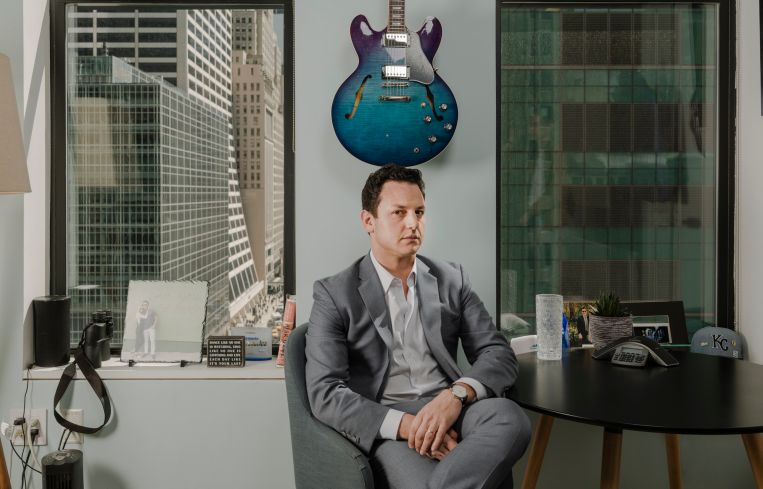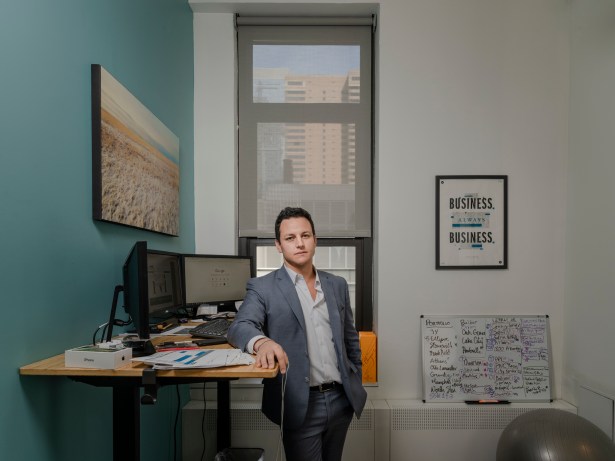The Natural: Ian Ross’ Somera Road Is Buying Your Distressed Real Estate
By Mack Burke November 5, 2019 9:30 am
reprints
“[Screw] funds,” Somera Road principal and founder Ian Ross told Commercial Observer earlier this year when asked whether he’d ever want to start one. “I don’t want to have to fit these deals into a box. We might have a $1.8 million deal or a $108 million deal.”
“These deals” have turned his 3-year-old firm into a heralded, but rather inconspicuous, private equity real estate shop deploying what sources told CO is a “clean playbook of perfect execution” on off-market, distressed CMBS real estate opportunities across the country.
In the years since its first deal in the summer of 2016 — the purchase of the 3Y Building, an office tower just north of downtown Kansas City — Somera Road has sourced and executed on 66 distressed deals at a valuation of over $1.5 billion across 49 markets and nearly half of the continental United States.
Ross started the company out of his Manhattan apartment in the summer of 2016 and has since grown the team to 15 professionals, who punch above their weight and successfully execute and asset-manage across the firm’s unbelievably large footprint.
“Oh boy, do they know how to work a deal,” the managing partner of a global hedge fund exasperatedly told CO, on the condition of anonymity because the manager is in the process of raising a new fund.
Ross, a former financier, doesn’t take himself too seriously, which is somewhat of an antithesis to the way he runs his business. He’s a 33-year-old commercial real estate “junkie” from Los Angeles, who said he’s only as good as the sum of the parts of his company — he works within a climate of “radical transparency.”
“The amount of deals that he’s closed, executed — in terms of the business plan — sold, stabilized and refinanced, it’s nothing short of a miracle in the world we live in,” Tim Dunn, the chairman of Kansas City-based JE Dunn Construction, told CO. Dunn said they’ve worked on around 15 deals with Somera, including its first, the 3Y Building.
While Somera is headquartered in New York, you’ll find their footprint in places like Allentown, Pa.; Athens, Ga.; Huntsville, Ala.; Tulsa, Okla.; Memphis and Cleveland. Some of the firm’s most high-profile deals to date have been in Memphis, Kansas City, St. Louis and Pittsburgh.
The walls of Somera’s office at 130 West 42nd Street in the belly of Times Square are adorned with mementos and sports memorabilia his team has collected from their work in the secondary and tertiary markets where they target distressed real estate. In his conference room are framed news clippings from Memphis, Tenn.’s The Commercial Appeal that show him shaking hands with local and state officials as well as Fedex Logistics executives after sealing arguably his most high-profile deal to date: a lease with Memphis-based global enterprise FedEx Logistics at the Gibson Guitar Building, a former guitar manufacturing facility in Downtown Memphis. FedEx Logistics CEO Richard Smith is planning an adaptive reuse of the property into an office hub to serve as the global headquarters for the company, which decided to move to the area to attract young talent and help spur a revitalization of the city’s downtown.
Next to the framed Commercial Appeal news clips is a Gibson guitar that Ross was gifted by his team following the closing of the FedEx deal. Ross had gifted Smith the same guitar, donning FedEx purple and orange, at the ribbon cutting in February; it was the last one manufactured at the location.
Somera (Ross named his company after the road on which he grew up in Los Angeles) has perfected a strategy of finding distressed assets in special servicing via commercial mortgage-backed securities (CMBS) trusts. It trades in distressed CMBS credit, buying and using the rights of the controlling bondholder to pull out and work out deals. They buy, execute, stabilize, monetize and repeat, aiming at smaller deals that are typically bypassed by larger institutional firms.
“His approach to how he finds assets and the ways he’s gone about doing it has been a very overlooked strategy by most,” said Matthew Philip, the head of commercial lending at Bayview Asset Management. “Going into CMBS trusts, looking for things from special servicers and really understanding what’s going on in those legacy deals, is textbook. [They] find where the distress is and take advantage of the opportunity, while being smart about what’s presented to [them]. To some extent, the complexity of pulling assets out of the trust, seeing that the distress isn’t always related to the specific asset but to the structure that’s behind it, is the genius in the approach. I don’t think a lot of developers have seen that opportunity that exists, especially with the smaller assets.”
Ross seemingly amazes those who transact with him. He has found a happy medium living under the realm of a major institutional investor but above the fray of a single-family office. He “runs his team hot, with a shock-and-awe approach,” the global hedge fund manager said. “He always beats his base case and is conservative by design.”

The firm has found a sweet spot in being sub-institutional, but Ross and Somera have to make up for that in volume, which they’ve proved is no issue, according to sources who spoke to CO.
The global hedge fund manager, who’s invested in a handful of Somera’s deals in the last year or so, said, “[Ross] knows that if he goes above a $20 or $30 million equity check, he’s up against a Blackstone, and things get ugly quickly … a $5 or $10 million check size on his management fee [nets them] probably [$500,000] or a million bucks a year. It’s nothing, but he’s just doing so many of them. It’s hard to compete with him. You have to be able to get messy with him on $5 [million] to $20 million deals. For a lot of people, it’s just not worth it. For him, it’s because he is trying to compound at very high rates of return, not collect a management fee.”
Somera works unbelievably fast in all aspects of its business and has on numerous occasions found a buyer for a project before even closing on its purchase. Out of the deals he’s done, “[many of them] never even made it to market, because he had already done what he had to do before he equitized them; that’s the speed this guy works at. It’s crazy,” the hedge fund manager said. “He’s sourced extremely well.”
Ross frequently challenges his newest or youngest employees by giving them free reign to run transactions — sometimes overseeing entire regions of the country — just to instill a level of trust and to see how they react to executing his firm’s playbook. That strategy hasn’t always panned out for the younger, less experienced employees, some of whom have felt overwhelmed and even left the firm. But Ross doesn’t care; where some failed, many have succeeded, becoming key members of his team. (Somera was named as one of Inc. Magazine’s Best Workplaces 2019.)
“His guys hustle,” said the global hedge fund manager. “They won’t last in his culture very long if they don’t move at a very fast speed.”
The fund manager said that when he was introduced to Ross and Somera just under a year ago, he deployed a diligence team into Ross’ ecosystem and pool of existing investors “to fully understand what he was doing, because quite candidly, he’s such an outlier, I wanted to make sure it was real.”
Ross is a staunch opponent to the idea of overextending his firm, shooting higher or becoming a “fund,” because he considers it a headache and a hindrance to his investment philosophy. He said his team views itself as “disintermediating what is often times an archaic fund model,” and he said becoming a fund “is against everything we are about. We like to stay nimble and flexible, and we want to be able to do deals of any size, asset class, geography or risk profile without them having to fit into a specific box or mandate.”
Per the hedge fund manager who spoke to CO anonymously: “if [Ross] overstretches his [firm], he’ll shatter it … he’s self-aware.”
“Listen, if I had the cojones, I’d have done the same thing,” Bayview’s Philip said. “Once you develop relationships with those servicers and you’ve executed a couple times, they’ll come back to you to sell the assets. You can figure this [method] out if you’ve got a little bit of savvy and an understanding of individual markets. The smaller deals lie under a lot of people’s radars. The [firms] with the big staff don’t want to spend time on all these $3 [million] or $4 million purchases of these defaulted assets, even though you can hit a bunch of home runs with them; they want to deal with the bigger stuff.”
For Ross and his team, basis is everything. In a yield-starved world, he has no qualms with walking away from an attractive investment if he doesn’t feel it meets the parameters of his game plan; he’s done it several times before, to the surprise of some of his investors. “His deal standards are so high,” the global hedge fund manager said, highlighting that Ross aims for a 25 to 30 internal rate of return (IRR). “He’s buying A-grade assets at B- or C-grade prices, hunting in a patch that’s messy — $5 [million] to $20 million deals. His returns in a very short period of time are extraordinary.”
But, getting the idea of Somera’s model across to investors in the company’s early stages wasn’t easy.
“Raising the first $5 million on our first deal is the hardest thing I’ve ever done,” Ross said. “I don’t take that for granted; it was extraordinarily challenging. But, you get the first deal done, and you build from there. We did our first deal in the summer of 2016. We did our second and third deals that November and December. And then I think we did [around] 26 deals in 2017. It was really kind of a snowball effect.”
In December 2017, Ross made his move on Memphis.
That month, Somera purchased guitar manufacturer Gibson’s real estate in Memphis and Nashville for around $32 million. The Memphis location — at 145 Lt. George W. Lee Avenue in the middle of the city’s Downtown — included what is a 150,000-square-foot factory and showroom and a nearby 350-space parking lot, where Ross is planning to develop a separate 350,000-square-foot office building called “The Clipper.” (The project is under development, Ross said, but before they started, he said Somera leased the parking lot to an operator—triple-net—who would run it for use during events and basketball games at the adjacent FedExForum). Ross and his partners explored other uses for the Gibson space, such as retail — for a grocery store — office or even a potential brewery, according to a 2017 letter sent by a legal representative of the investor group to the Center City Revenue Finance Corporation.

A few months later in the spring, Ross was approached by Billy Orgel and his son Benjamin — Memphis natives and community staples — who wanted to get involved, eventually taking a minority stake in the property and injecting Downtown development expertise and much-needed local backing.
Billy Orgel is the CEO and president of Tower Ventures, which develops wireless communications structures, and he sits on the Shelby County School board. His son Benjamin works for Memphis-based Slovis and Associates, a full-service commercial real estate firm; he’s also on the board of the Downtown Memphis Commission. The month that Ross bought the Gibson facility, the Orgels were wrapping up a conversion of the historic 19th century Tennessee Brewery in the city’s South Bluffs neighborhood — located just Southwest of Downtown, overlooking the Mississippi River — into a $42 million, mixed-use complex complete with multifamily rentals, office and retail space and a parking garage.
Around the time the Orgels entered Somera’s Gibson project, the newly formed FedEx Logistics’ CEO, Richard Smith, felt like planting a flag in Downtown Memphis.
“Strategically, it made a lot of sense to me,” said Smith, a Memphis native and son of billionaire FedEx founder Fred Smith. “It was kind of bringing the mountain to Muhammad, so to speak, in terms of where the talent is, so I was very interested in this.”
Smith got in front of the Orgels and learned of Ross.
“[Ross] brought on some people that really were well connected, particularly in the downtown market, which I think was a very, very smart move,” Smith said. “What struck me about Ian, at first, was he’s very young. But, I’ll tell you, he is a very sharp and dynamic businessman for his years. He was extremely passionate about Memphis and about the community. That spoke to me.”
Smith said Ross jumped at the idea to do Class A office space for a corporate headquarters. After some hesitation on the part of Smith to go forward with the plan, they picked it back up in December 2018 and haven’t looked back. The FedEx Logistics lease at the building will begin in April next year, the company has said. FedEx will expand the building from 154,000 square feet to just under 200,000 square feet.
Ross’ persistence and curiosity was bred from a young age.
Growing up, Ross’ parents instilled in him and his two brothers an unyielding ambition and an unwavering will to never stop learning, he said.
Ross’s father is an obstetrician, expert witness and a distinguished professor at UCLA medical school, and his mother is a counterterrorism consultant. His parents moved to Los Angeles from Boston when he was a kid, and he’s the middle brother of his two siblings. He’s married to a fellow entrepreneur: His wife started her own public relations business servicing the fashion industry.
“We use a twin desk at home,” Ross said. “She’s got hustle. I wouldn’t be here or have the motivation that I have without her.”
As an undergraduate, Ross attended Goizueta Business School at Emory University in Atlanta. He got his start in commercial real estate at Morgan Stanley in the summer of 2007, where he focused on originating and securitizing large, floating-rate CMBS loans, moving to an investment banking role at Jefferies & Company in December 2007.
In 2009, he saw an opportunity to join a newly formed family office called Triangle Capital.
“I came on and helped build that team, really, from day one,” Ross said. “It was myself and two senior partners — I was a junior partner and managing director [of acquisitions and asset management]. We built that team from three of us in a broom closet with a Bloomberg terminal into an 18-person operation.”
When Ross joined Triangle, they started focusing on buying distressed legacy CMBS credit at the bottom of the market.
“I always joke that when ‘The Big Short’ ends, we were the first scene of a sequel; we really came in at the bottom and started picking up the pieces,” Ross said. “From 2009 to 2013, there was a real arbitrage opportunity. CMBS is a more commoditized, yield-driven product; it was never supposed to be a credit product, because losses were never supposed to be severe. You have very few bricks-and-sticks guys in the CMBS space, and you had very few guys that understood CMBS in the real estate space, so if you could come in in 2009 and really understand the real estate, but also have access to the street, to buy CMBS CUSIP credit, there was a tremendous operational arbitrage.”
Ross identified his current investment philosophy at Triangle but was somewhat handcuffed by the institutional flavor of the shop. He wanted to asset manage and operate the real estate. (While at Triangle, he started his MBA at the Wharton School at the University of Pennsylvania, finishing it within six months after leaving in 2014.)
“You wouldn’t learn his kind of commercialism at a bank,” the global hedge fund manager said.
While a few of his investors said they were unsure of Somera’s ability to execute the same playbook in a downturn — “distressed assets in distress” — its track record will keep them interested.
“For lack of a better term, they’re shit kickers; they get shit done,” the global hedge fund manager added. “[Ross] is 33 and has the hallmarks of something pretty special. But, he’s just at the starting line.”



